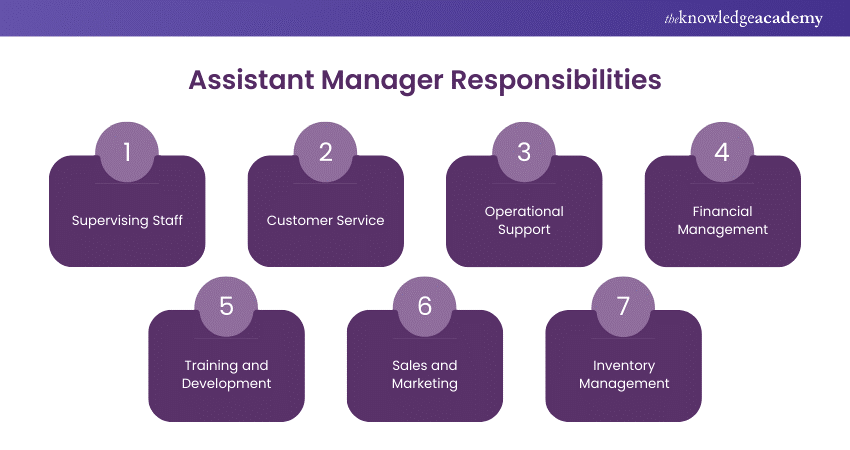We may not have the course you’re looking for. If you enquire or give us a call on +47 80010068 and speak to our training experts, we may still be able to help with your training requirements.
We ensure quality, budget-alignment, and timely delivery by our expert instructors.

Ever wondered what it takes to be an Assistant Manager? The role is vital in keeping business operations running smoothly and ensuring top-notch customer service. In this blog, we discuss the Assistant Manager Job Description, exploring the key responsibilities, essential skills, and steps to achieving this role.
Whether you're aiming for a promotion or starting a new career path, understanding this job can help you succeed and support your team's success. Ready to learn more about what makes a great Assistant Manager? Let's get started!
Table of Contents
1) What is an Assistant Manager?
2) Assistant Manager Responsibilities
3) Assistant Manager Skills
4) How to Become an Assistant Manager?
5) Assistant Manager Salary Expectations
6) Template for Assistant Manager Job Description
7) Conclusion
What is an Assistant Manager?
An Assistant Manager supports the Manager in the day-to-day operations of a business. They play a crucial role in ensuring that everything runs smoothly, handling tasks such as supervising staff, managing budgets, and maintaining excellent customer service. Their role is versatile, often stepping in for the Manager when needed and helping to drive the overall success of the team and business.
Assistant Manager Responsibilities
The responsibilities of an Assistant Manager can depend on the industry and company, but generally include:

a) Supervising Staff: Overseeing the work of employees, providing guidance, and ensuring that tasks are completed and to a high standard.
b) Customer Service: Handling customer inquiries and complaints, ensuring a positive experience for clients and resolving issues promptly.
c) Operational Support: Assisting in the development and implementation of policies and procedures to improve productivity.
d) Financial Management: Assisting with budgetingtarget="_blank" rel="noopener" title="what is budgeting">budgeting, forecasting, and financial reporting to support the financial health of the business.
e) Training and Development: Organising training sessions for staff, helping to develop their skills and knowledge.
f) Sales and Marketing: Supporting sales initiatives and marketing campaigns to drive business growth and achieve targets.
g) Inventory Management: Overseeing stock levels, ordering supplies, and ensuring that inventory is managed effectively.
Eager in taking the next step to be an assistant manager, refer to our blog on "Assistant Manager Salary"
Assistant Manager Skills
Assistant Managers need specific skills to be successful. Here are some of them:
a) Leadership: Strong leadership skills to motivate and manage a team effectively
b) Communication: Excellent communication skills to interact with staff, customers, and other stakeholders
c) Problem-solving: Ability to quickly identify issues and develop effective solutions
d) Organisational Skills: Strong organisational skills to manage multiple tasks and priorities efficiently
e) Customer Focus: A commitment to providing customer service and resolving issues satisfactorily
f) Financial Acumen: Basic understanding of financial principles to assist with budgeting and financial management
g) Adaptability: Ability to adjust to changing situations and handle unexpected challenges
Learn methods of responding to conflicts with our CMI Level 3 Certificate in Principles of Management and Leadership Training – Join today!
How to Become an Assistant Manager?
Becoming an Assistant Manager typically requires a combination of education, experience, and skills:
a) Education: A high school diploma is often required, though some employers may prefer candidates with a college degree in business or a related field.
b) Experience: Gaining experience in the industry and demonstrating leadership potential is crucial. Many Assistant Managers start in entry-level positions and work their way up.
c) Skills Development: Developing key skills, such as leadership, communication, and problem-solving, is essential.
d) Certifications: While not always necessary, obtaining relevant certifications in management or specific industry skills can enhance your qualifications.
e) Networking: Building professional relationships and seeking mentorship from experienced managers can provide valuable insights and opportunities.
Boost your leadership skills with our CMI Level 3 Award in Principles of Management and Leadership Training – Join today!
Assistant Manager Salary Expectations
The salary of an Assistant Manager varies based on several factors, including location, industry, certifications, and experience. Below is a detailed breakdown of these variations across three major locations: the UK, the USA, and India.

Source: Glassdoor
Template for Assistant Manager Job Description

Interested in taking up a career as First Line Manager, refer to our blog on "First Line Manager Skills"
Conclusion
Understanding the Assistant Manager Job Description is essential for those aspiring to take on this important role. Assistant Managers play a key part in ensuring smooth operations, supporting staff, and providing excellent customer service. By developing strong leadership, communication, and organisational skills, you can contribute significantly to your team and organisation.
Learn coaching techniques with our CMI Level 3 Diploma in Coaching and Mentoring Training – Join today!
Frequently Asked Questions
What are the Top Priorities of an Assistant Manager?

The top priorities of an Assistant Manager include supervising staff, ensuring excellent customer service, and maintaining smooth daily operations. They also focus on training employees, managing budgets, and supporting sales efforts.
What is an Assistant Manager Also Known as?

An Assistant Manager is also known as an Associate Manager. In some organisations, they might be referred to as a Deputy Manager.
What are the Other Resources and Offers Provided by The Knowledge Academy?

The Knowledge Academy takes global learning to new heights, offering over 3,000 online courses across 490+ locations in 190+ countries. This expansive reach ensures accessibility and convenience for learners worldwide.
Alongside our diverse Online Course Catalogue, encompassing 19 major categories, we go the extra mile by providing a plethora of free educational Online Resources like News updates, Blogs, videos, webinars, and interview questions. Tailoring learning experiences further, professionals can maximise value with customisable Course Bundles of TKA.
What is The Knowledge Pass, and How Does it Work?

The Knowledge Academy’s Knowledge Pass, a prepaid voucher, adds another layer of flexibility, allowing course bookings over a 12-month period. Join us on a journey where education knows no bounds.
What are Related Courses and Blogs Provided by The Knowledge Academy?

The Knowledge Academy offers various CMI Level 3 Courses, including CMI Level 3 Award in Principles of Management and Leadership Training, CMI Level 3 Certificate in Principles of Management and Leadership Training, and CMI Level 3 Diploma in Coaching and Mentoring Training. These courses cater to different skill levels, providing comprehensive insights into Difference Between ILM and CMI.
Our ILM, CMI Leadership & Management Blogs cover a range of topics related to CMI, offering valuable resources, best practices, and industry insights. Whether you are a beginner or looking to advance your Management skills, The Knowledge Academy's diverse courses and informative blogs have you covered.
Upcoming ILM, CMI Leadership & Management Resources Batches & Dates
Date
 CMI Level 3 Award in Principles of Management and Leadership Training Course
CMI Level 3 Award in Principles of Management and Leadership Training Course






 Top Rated Course
Top Rated Course



 If you wish to make any changes to your course, please
If you wish to make any changes to your course, please


